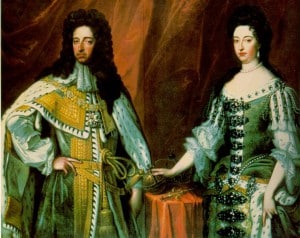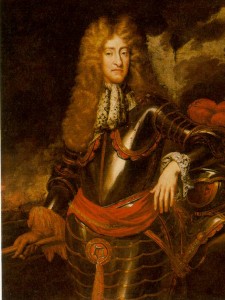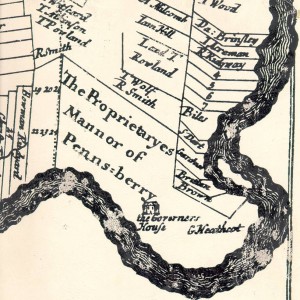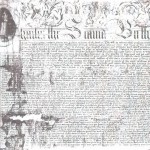The Crown took control of Pennsylvania away from Penn for two years. England and France were fighting in the American colonies. By revoking proprietorships, the crown hoped to build revenue for English wars. The King took control of Pennsylvania and appointed a new governor, Benjamin Fletcher, who would also force the antiwar Quaker Assembly to provide military support.
Timeline Category: William Penn
1689

The Glorious Revolution
When Charles II died, the throne of England passed to his brother, James. This worried those loyal to the Church of England, as James was Catholic. But as long as his protestant daughters Mary and Anne were heirs to the throne, they tolerated him. When his queen gave birth to a son (who would definitely be raised Catholic), the English people rebelled. James fled to France where he lived in exile, and his daughter Mary and her husband Prince William of the Netherlands are crowned.
Penn’s fortunes changed dramatically after James II is overthrown. Penn was accused of treason for his loyalty to deposed King James II. In 1690 he was placed in the Tower of London for several weeks, but was cleared of all charges. However, in 1691 the government issued yet another arrest warrant, but does not actually arrest Penn.
1685
1684
After only two years in America, Penn followed Maryland’s Governor, Lord Baltimore, back to England. Both claimed rights to the land that would later be known as Delaware. It was ultimately decided to be part of Penn’s colony.
Witchcraft in Pennsylvania
Before leaving in 1684, Penn oversaw Pennsylvania’s only witchcraft trial. He urged restraint, and Margaret Mattson was found guilty of the common fame of being a witch, but was not guilty of actually being a witch. Later witch trials in the Puritan town of Salem, Massachusetts would result in the hanging of nineteen people
1683
1682
Penn sailed for America onboard the Welcome. This was Penn’s first trip to America, and he arrived that fall after smallpox killed 31 of his fellow passengers.
On July 5, William Markham, Penn’s cousin and agent, made the first land purchase from the Lenape. This included the future site of Pennsbury.
The Lenni Lenape
William Penn was committed to peace in the colony, and began developing friendly relations with the Native Americans before arriving in Pennsylvania. Because of his fair trade practices and willingness to learn their culture, Penn immediately established a reputation for dealing fairly with the Lenni Lenape. Of course, peace could not have been possible had the natives been hostile to Penn’s overtures. Part of his success was due to fortuitous circumstances. The natives to the west (the Susquahannocks, in the Susquehanna Valley) had left their land, so the Delaware Valley Indians (later known as Lenni Lenape) were able to give their lands up to the flood of Europeans and move to western territory without hindrance. Otherwise rapport between Penn and the Lenape would probably not have been so cordial.
“When I was at William Penn’s Country House…Part of the Time I spent in seeing… William Penn and many of the Indians…in Council and Consultation …all which was done in much Calmness of Temper and in an amicable way.”
John Richardson, 1701
1681
1675
Penn mediates a dispute between two of West New Jersey’s Quaker proprietors. Then, he becomes a trustee of West New Jersey. This is Penn’s first official contact with America. He works with the other trustees to make West New Jersey a haven for Quaker colonists.
1672
Penn married Gulielma Springett, a fellow Quaker, and moved to Basing House. They would have eight children, but only three would reach adulthood: Springett (1675-1696), Letitia (1678-1746), and William Penn Jr. (1681-1720).
1670
Penn was arrested for “unlawful preaching” but a jury declared him not guilty.
Penn’s father, Admiral William Penn, died. From his deathbed, Admiral Penn petitions King Charles II to favor his son.
Penn-Meade Trial
Penn and fellow Quaker William Meade were arrested in 1670 for preaching on a London street. The jury found him not guilty on charges of inciting a riot. This was a groundbreaking shift in legal precedent, as the jury refused to bow to pressure from the Lord Chief Justice and Recorder of London to declare them guilty. They even imprisoned the jurors for 3 days without food, water, or chamber pots, but still they would not relent. Parliament soon after passed a law protecting juries from being jailed or punished for their decisions.



